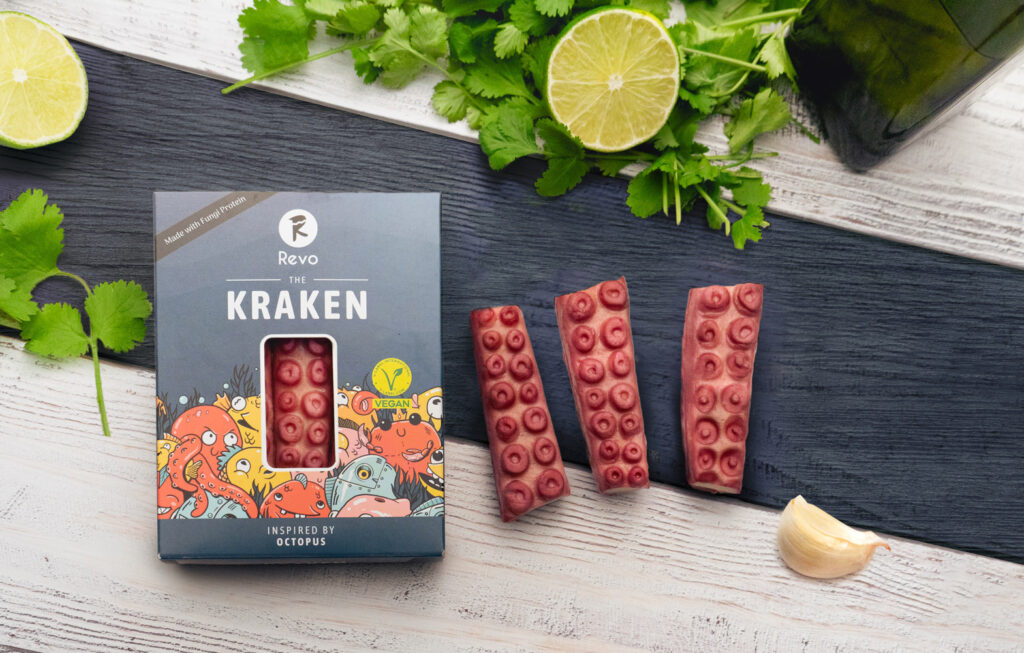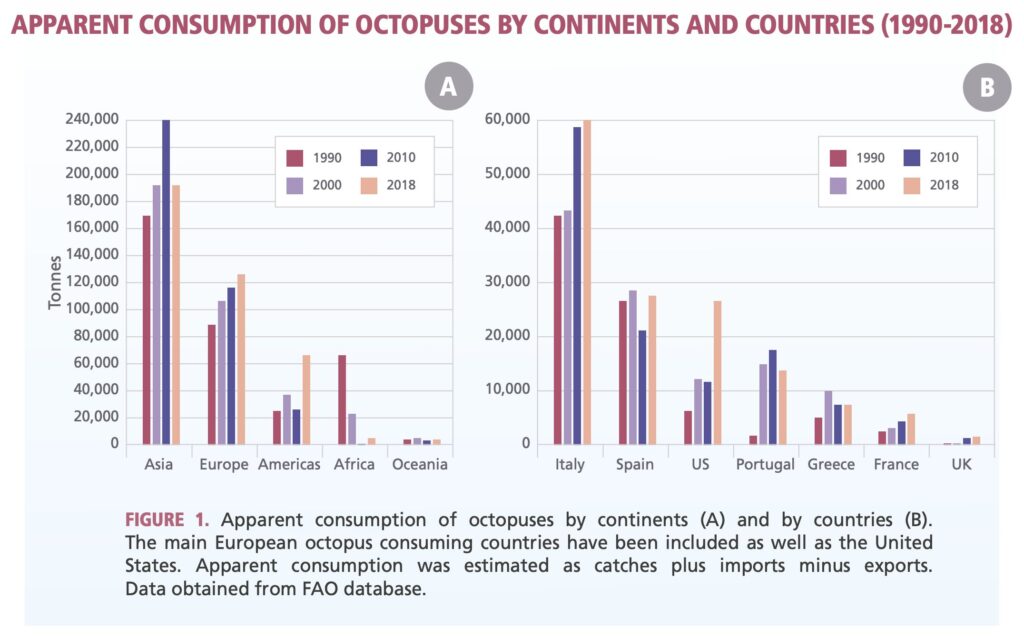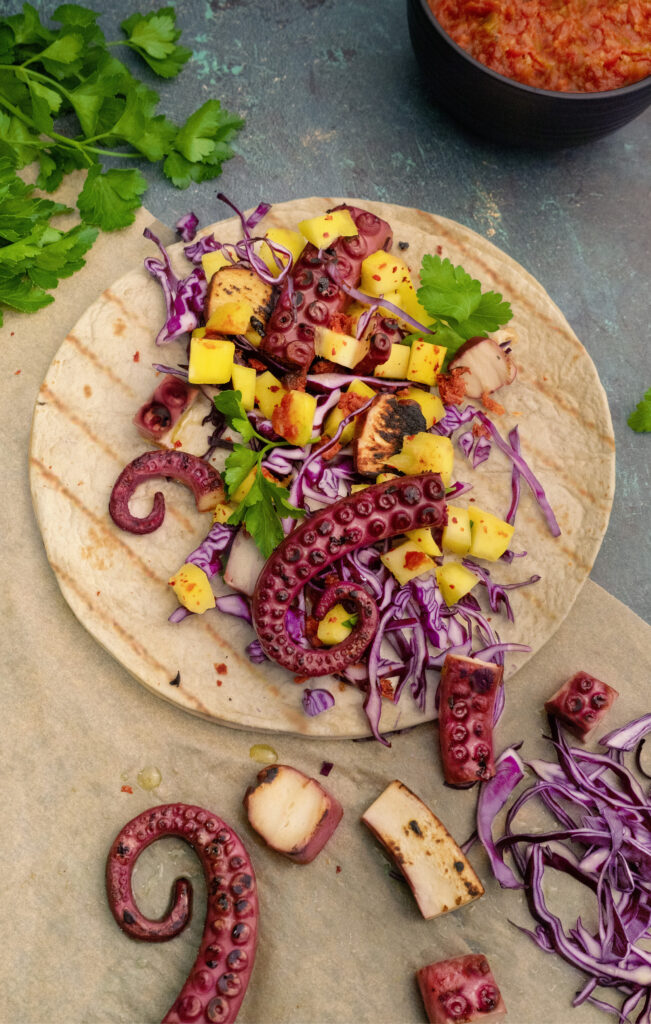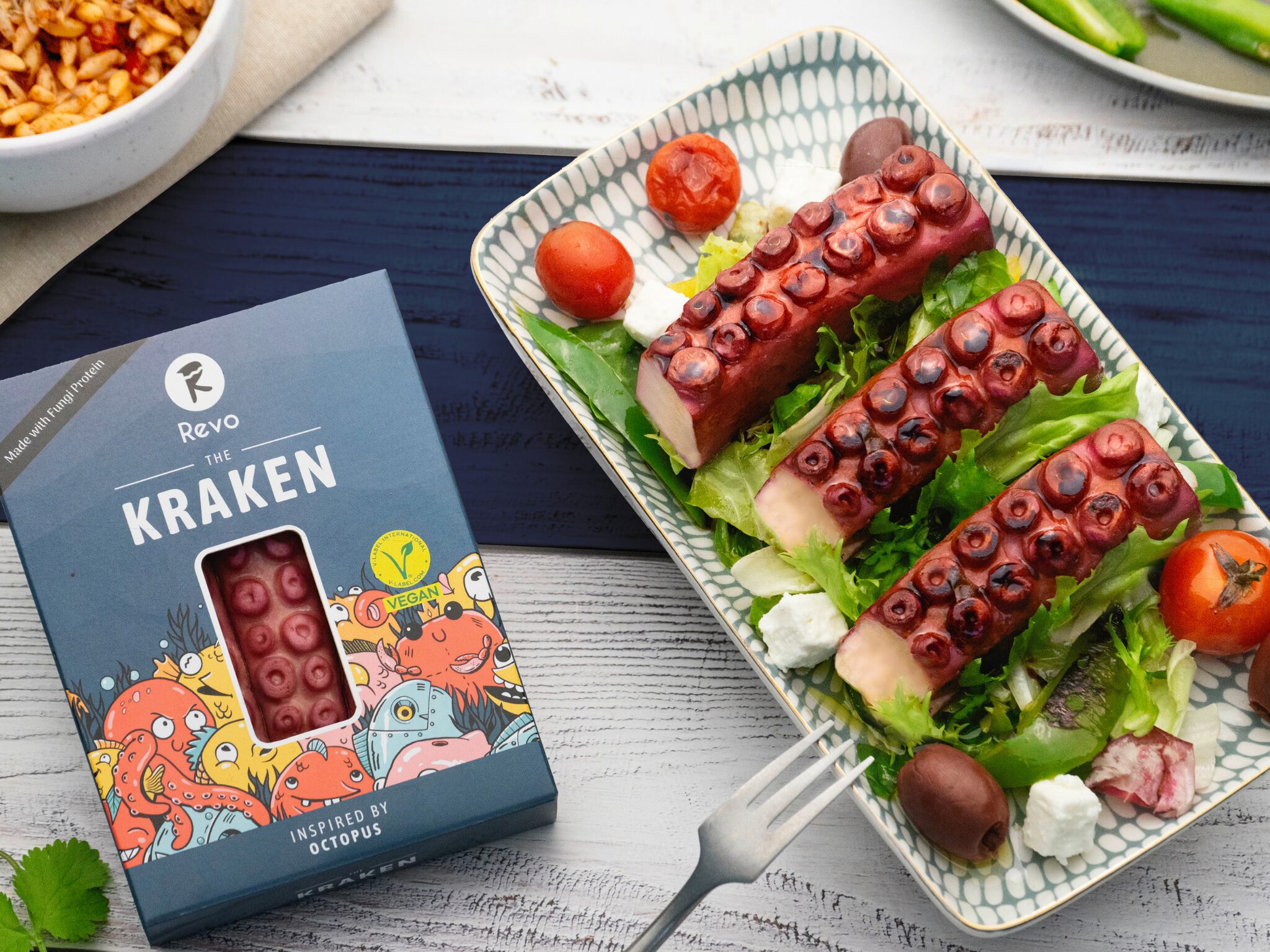7 Mins Read
Revo Foods has today launched the world’s first vegan octopus for retail, using its patented 3D-printing technology to transform fungi into a seafood analogue beloved by many, and one being increasingly unethically farmed.
Six months on from launching its 3D-printed salmon alternative into supermarkets, Austrian food tech startup Revo Foods has introduced a new category in the alternative seafood sector. Its latest innovation is called The Kraken – Inspired by Octopus, and is produced using mycoprotein and 3D-printing technology.
These vegan octopus tentacles are a global first and a limited-edition drop born out of the startup’s ongoing crowdfunding campaign, which has already brought in €1.1M of its maximum €1.5 target. The inspiration to create The Kraken came from the fact that there are no existing alternatives, as well as its “super unique” appearance, which serves as a showcase for what Revo Foods’ tech can do, explained Revo Foods CEO Robin Simsa. “While it’s probably a smaller market than salmon/tuna or other big fish species, it is nevertheless an interesting market opportunity without a lot of competition (yet),” he told Green Queen.

He added: “Octopus is a very specific product, and in Europe, it is mainly consumed in Spain, Italy and Greece, and much less in northern European countries. We believe this is less a product for retail, and more for food service/specialty vegan shops. However, with this limited edition (several 100 packages), we want to get more information on consumer feedback and also share samples with some restaurant partners as well.
“If the feedback is positive and we see this market opportunity as big enough, then it is possible that we launch this product permanently later this year. Nevertheless, we believe it is already an amazing showcase to show what is possible with new plant-based technologies nowadays.”
The product – which is ready to eat but can be grilled, fried and baked too – is available exclusively at Revo Foods’ e-commerce site and is available for delivery in most EU countries.
A nutrition-packed alternative to global seafood delicacy
Octopus is a delicacy and common food ingredient in many cultures and countries, including Italy, Spain, Japan, Greece, South Korea and Turkey. It’s used in dishes like polbo á feira, meze, sushi and carpaccio, and Revo Foods says its innovation can be used to recreate these dishes, but with a vegan twist.
Apart from the ethical perspective, which we expand on below, Revo’s octopus alternative offers clear health benefits. Octopus heads have high amounts of selenium and can carry a risk of cadmium poisoning, even in small amounts. Some studies have also found the presence of heavy metals like lead in octopus tissue, a direct result of marine pollution.
Revo Foods’ mycoprotein-based octopus avoids all those issues. It also means people with shellfish allergies can consume a version of this popular seafood product. Plus, The Kraken has an A ranking on the Nutri-Score scale and is high in protein, omega-3 fatty acids, and dietary fibre. This will speak to consumers – research by the Aquaculture Stewardship Council in 2022, which covered over 12,000 people in 12 countries, revealed that health is the primary driver for buying seafood, with over 80% agreeing that including fish in their daily shopping is important for health.

The company, which has reeled in €7M in investment to date, employs a patented 3D-MassFormer extrusion technology, which enables “seamless integration of fats into a fibrous protein matrix”. The startup has developed what it says is the first-ever continuous manufacturing process capable of mass-producing 3D-printed food, and hopes to demonstrate the potential of the tech through whole-cut seafood products.
With the funds from its crowdfunding campaign, it will expand its manufacturing capacities to start production on the second iteration of its whole-cut salmon filet, slated for launch this autumn. “Also, we are working with several partners on customising food products according to their needs (e.g. specific shape/form that stands out), which is one of the main advantages of our 3D production technology,” said SImsa.
It comes at a time when vegan seafood forms a fraction (0.2%) of the overall seafood market, and just 1% of the plant-based meat category as well. Startups like New Wave Foods and Ordinary Seafood have recently ceased operations, but there have been success stories of late too, not least Revo Foods itself. Last month, it landed a legal victory over the City of Vienna after a court dismissed a suit accusing the startup of misleading consumers with its product labels.
“I believe the whole field is simply ‘growing up’,” said Simsa. “Before, there were possibly some inflated expectations, and some investors (or other people) expected food tech companies to grow at the same speed as B2B SaaS companies, which is simply not possible due to the high amount of R&D needed.”
Adding that he doesn’t believe plant-based sales are continuing to decline, citing multiple data points that have shown a year-on-year increase, he added: “Once we hit an infliction point where quality/price is convincing enough, there will be an even accelerated development I believe, and we are not far from that (5 years max. Is my estimation for some product types).”
The mycoprotein market itself, meanwhile, is estimated at $2.85B, with companies like Quorn, ENOUGH and The Better Meat Co all innovating with novel meat and seafood analogues.
Why octopus farming is unethical and bad for the planet

According to figures from the UN FAO, the EU consumed about 125,000 tonnes of octopuses in 2018, with Italy alone accounting for 60,000 tonnes. In Asia, meanwhile, this figure was even higher, reaching 190,000 tonnes that year. Overfishing has strained octopus populations worldwide, with global octopus landings on a continuous decline for several years now.
This has been met with attempts to create octopus farms in countries like Spain, Mexico, Chile, China and Japan, which have attracted a great deal of controversy. One Spanish company, Nueva Pescanova, aims to create an aquaculture farm akin to industrial animal agriculture that would yield 3,000 tonnes of octopus per year, equating to about a million octopuses. It has been met with fierce criticism from animal rights activists, academics and climate experts.
Octopuses are thought to be sentient creatures, with the UK government recognising them as such in a 2021 report, which meant the country joined the likes of Switzerland, New Zealand and the US in outlawing the act of boiling these molluscs, which is a common practice in many countries, and another source of scrutiny as these creatures are capable of feeling pain.
And since they don’t have any internal or external skeletons, with fragile skin that is easily damaged, in a farm environment, they’re likely to be injured by handlers or aggressive interactions with fellow octopuses. Plus, there are currently no recognised methods of humane slaughter that would be appropriate for such large commercial scales.
There are environmental concerns to consider too. As carnivorous creatures, they need fish or other seafood products – like fishmeal or fish oil – in their diet, which are still frequently harvested from the ocean, with some producers being accused of food colonialism too. It takes about 3kg of feed to produce 1kg of octopus, making this a highly inefficient use of resources.

As Jennifer Jacquet, a professor of environmental science and policy at the University of Miami, told the Guardian: “We’re not having the conversation of should we eat octopus or not, we’re simply at a crossroads where we can decide whether or not to put octopus into mass production. Do we need to do this? It’s really a luxury good. It’s not for survival. This is a symbol of what humans should not be doing in the 21st century.”
With nine brains, they are a highly intelligent, sociable and complex species. Wild octopuses are masters of camouflage and are known for their proficiency in hiding and escaping from predators. In lab settings, they’ve proven to be adept at solving mazes and other puzzles to acquire food rewards. The intelligibility and curiosity of octopuses was perhaps best documented in the 2020 Oscar-winning film My Octopus Teacher, where filmmaker Craig Foster develops an intimate bond with an octopus, who helps him connect with nature and the Earth in ways he never could have imagined.
“A lot of people say an octopus is like an alien,” Foster says in the documentary. “But the strange thing is, as you get closer to them, you realise that we’re very similar in a lot of ways.” It hits home the moral dilemmas of farming and eating octopuses, and outlines the importance of sustainable, ethical alternatives like Revo Foods’ The Kraken.
“Octopus tentacles, with their intense colour and distinct suckers, are a very special product with an exciting look,” said Revo Foods’ head of food tech, Niccolo Galizzi. “So far, there has been no realistic alternative on the market. The Kraken has the potential to be a real enrichment for octopus fans.”




